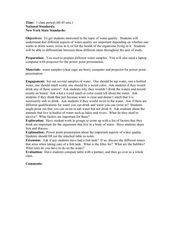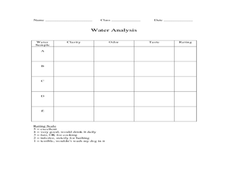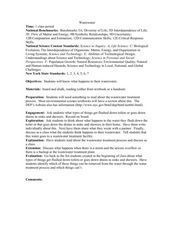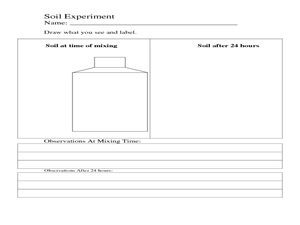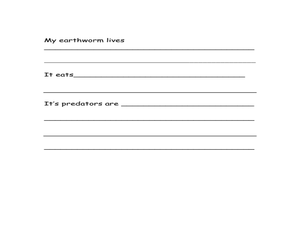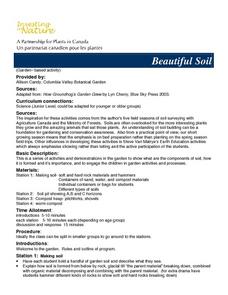Curated OER
Water Quality with Samples
Students recognize whether one wants to drink water, swim in it, or for the health of the organisms living in it. They prepare different water samples to observe and collect samples regarding the water quality.
Curated OER
Bottled Water vs. Tap Water
Students analyze the similarities and differences between tap water and bottled water. They make informed decisions about their use of each. Students are asked if they drink mostly tap water straight from the tap or water fountain. They...
Curated OER
Wastewater
High schoolers discuss what happens to their wastewater. They read about the wastewater treatment process. Students are asked what types of things get flushed down toilets or goes down drains in sinks and showers. They are taught what...
Curated OER
Hudson Valley Rocks
Students identify each of the rocks provided and locate where in the valley they are found. They explain why the rocks came to be as they are in each location. In addition, they relate the exercise to how the Hudson Valley's geologic...
Curated OER
Glacial Groundwater
Students study glacial deposition and groundwater in Dutchess County, new York. They identify the permeability rates in different glacial deposits and relate this information to ground water capacity of sediments found in Dutchess...
Curated OER
How Much Water is in That River?
Students practice measurement using the Hudson River. They calculate the discharge measurement at a location on the Hudson River using ingenuity and a topographic map.
Curated OER
Think Green
Students experience and practice compositing and recycling through hands-on-activities. They distinguish between which items from their trash can be recycled, composted and reused. The process for making recycled paper is also covered in...
Curated OER
Trash Disposal Choices
Students investigate the use of landfills. In this landfill use and recycling lesson, students discuss what happens to trash and junk. They review the types of trash before categorizing a list of items they throw away each day. They...
Curated OER
Integrated Solid Waste Management
Learners examine the EPA's approach to integrated solid waste management. They read about source reduction, recycling, composting, waste-to-energy incineration, and land filling, and create symbols for each of the aspects of solid waste...
Curated OER
The Rotten Truth
Students study the process of decomposition using lunch leftovers and soil. They complete the inquiry over set periods time as they observe the how composting takes place and finally, they sort the materials into biodegradable,...
Curated OER
Under Our Feet
Students investigate the forest ecosystem to learn of the living and non-living elements of the soil. For this ecosystem lesson, students examine soil for twigs, moss, fungi, leaves, roots and other matter. Students...
Curated OER
WHAT'S ORGANIC?
Students explore how certain foods come to be certified "organic." They write the words "organic" and "synthetic" and given the definitions of each. Students are given dictionaries. They are asked: "What is organic food?" Students grow...
Curated OER
Litter Prevention
Students determine why litter is undesirable and that littering is a behavior that can be changed. They rank a variety of litter items from "most undesirable" to "least undesirable" and discuss their reasoning. They group the "litter"...
Curated OER
Decomposition, Soil, and Life Cycle Research
Students conduct background research on the decomposition process, soil composition, and the life cycle using the resources provided for Internet searches. They work in collaborative groups to research topics as a particular plant, soil...
Curated OER
Micro-organisms
Students learn what a micro-organism is. In this micro-organism lesson, students understand that micro-organisms may be too small to see. Students learn microorganisms could be bacteria, fungi, something beneficial or a harmful microbe....
Curated OER
Earthworms and Making a Wormery
Students explore the environment by researching insects. In this earthworm lesson, students utilize soil and plexiglass to build a see through wormery in which students can observe the worms at work. Students identify the benefits of...
Curated OER
Decomposers- Nurse Logs
Students investigate temperate forest ecosystems. In this environmental activity, students discover different forms of decomposition and its effect on the environment.
Curated OER
Plastics: Field Trip - Vancouver Landfill
Students examine the amount of garbage that is produced by the City of Vancouver. In this landfill lesson, students participate in a field trip to the City of Vancouver Landfill. They look at what happens to garbage, recycling, and yard...
Curated OER
Beautiful Soil
Students discover what are the components of soil. They examine how it is formed and it's importance. They engage in garden activities and processes. They hold a handful of garden soil and describe what they see. They take a...
Curated OER
Soil Soakers
Students work together to discover the relationship between water holding and drainage characteristics of soils. They record their observations and discuss the results. They examine particle size and pore sizes as well.
Curated OER
Reduce Reuse Recycle
Students discover methods that can save the planet by recycling. In this sustainable planet lesson, students read The Berenstein Bears Don't Pollute Anymore, and practice memorizing the 3 R's. Students write commitment...
Curated OER
Illegal Dumping
Pupils go on an outing and note garbage near picnic tables. They brainstorm ways to be involved with anti-litter campaigns and write letters to local officials.
Curated OER
Vermicomposting
Third graders study vermicomposting. In this vermicomposting lesson, 3rd graders prepare to begin a unit on decomposition by constructing a worm bin. Students collect worms to be used later in experiments.
Curated OER
Student Designed Investigations: Observations
Students choose an organism and create an experiment with that organism. In this observation lesson, students expose a living thing to something from its environment and record their observations. Students must have some prior knowledge...
